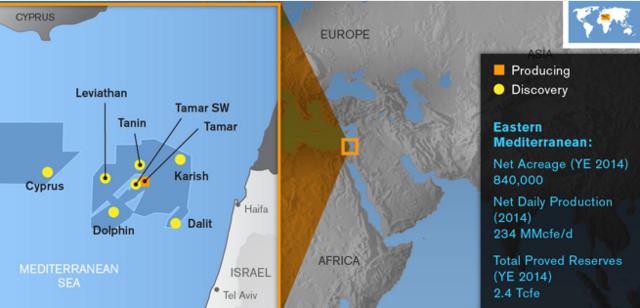Summary
Some of the major obstacles related to Noble Energy’s Leviathan plans have been removed.
Noble Energy and the Israeli government are keen to quickly begin work in the Mediterranean Sea.
The company now has better visibility over Leviathan than ever before. .
However, if the sub-$50 a barrel oil price environment persists, then Noble Energy could delay the final investment decision on Leviathan.
Noble Energy (NYSE:NBL) is moving, albeit slowly, towards tapping into the massive Leviathan gas field, located in offshore Israel.
Leviathan, which holds up to 22 trillion cubic feet of reserves and was discovered nearly five years ago, has been one of the biggest gas discoveries in the region and the largest one for Noble Energy ever. Ideally, by now, Noble Energy would have been pumping gas from this field for a year if the company had taken a final investment decision in early 2011. But Noble Energy and Delek Group (OTCPK:DGRLY), the field's developers, have faced stiff opposition from Israeli regulators and lawmakers due to anti-trust concerns. A lack of regulatory framework regarding offshore energy projects further exacerbated Noble Energy's woes.
Noble Energy in Eastern Mediterranean.
Image © Noble Energy
However, under Prime Minister Benjamin Netanyahu, Israel seems to be heading in the right direction. The resignations of Israel's economy minister Aryeh Deri and the antitrust commissioner David Gilo, the main opponents of the government and Noble Energy's Leviathan plans, and the approval of the regulatory framework by the Israeli Cabinet and the Knesset (the parliament) have paved the way for development of Leviathan as well as the country's other offshore hydrocarbon reserves.
The government is now keen to fast-track the process which will ultimately lead towards Leviathan's development and expansion of the closely located Tamar field. Noble Energy has been pumping gas from Tamar, a relatively smaller field which holds up to 10 trillion cubic feet of gas reserves, since 2013.
Noble Energy also seems eager to quickly begin work in offshore Israel. During its recent third quarter conference call, Noble Energy identified that the demand of natural gas around the Mediterranean exceeds supply by four billion cubic feet; and this gap could widen to nine billion cubic feet by 2025. The company has recently sold 47% interest in two gas fields in offshore Israel for $67 million to Delek in order to address the anti-trust concerns. The sale will also improve Noble Energy' cash reserves, bolstering the company's balance sheet preservation efforts amid the ongoing downturn.
Noble Energy has also said that it will likely make a final investment decision on Leviathan and Tamar within the next twelve months. Assuming the company decides to move forward with Leviathan by the middle of 2016, then it can report first production from the field by mid-2019 at the earliest.
So it is going to take some time before the company reports an increase in production and cash flows related to Leviathan. But nonetheless, the future prospects of Leviathan are looking clearer than ever. Unless there is a major shift in the political setup in Israel, I believe that there is a real possibility that Noble Energy will start producing gas from Leviathan within the current decade, though the weak oil price environment could become another obstacle.
For now, Noble Energy's offshore drilling activity work will largely occur at the Gulf of Mexico where its two projects, Big Bend and Dantzler, have recently reported first oil production. Focus has now shifted to Gunflint field, located west of Dantzler, which is slated to come online by the middle of next year. Total production from the Big Bend and Dantzler projects is quickly reaching peak capacity 20,000 barrels per day. The three offshore fields will play a crucial role in driving volume and cash flow growth in 2016.
Due in part to Gulf of Mexico projects, Noble Energy expects to report higher production next year on a pro-forma basis. Though judging from what we've heard during the recent conference call, Noble Energy's priority is to live within its cash flows in 2016, rather than achieve production growth. I believe this is the right approach, since the market is more likely to reward free cash flows than production growth in the downturn. This also means that if the sub-$50 a barrel oil price environment persists, then Noble Energy could delay the final investment decision on Leviathan. Instead, the company could focus only on ramping up the tried and tested Tamar field.
